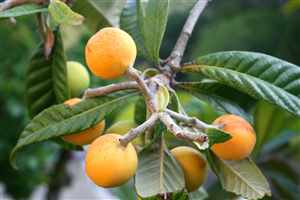Loquat (Eriobotrya japonica)
Main Facts about Loquat

Using Loquat
The leaves and fruit have high concentrations of calcium, phosphorus, iron, potassium, vitamin A, B, and C. The fruit is sometimes used as a sedative and is thought to reduce vomiting and excessive thirst. Leaves may possibly relieve diarrhea, support a healthy mood, counteract intoxication, and may also reduce swelling. Loquat syrup is used in Chinese medicine for soothing the throat and is a popular ingredient for cough drops, as well as to soothe the digestive and respiratory systems. In Japan, loquat leaves are dried to make a mild beverage to beautify skin and heal inflammatory skin conditions such as psoriasis and eczema and to heal chronic respiratory conditions such as bronchitis.Loquat is a remedy for: Anxiety
Cooking with Loquat
The skin of the loquat is easily peeled. Peeled fruits are eaten fresh or may be mixed with other fruits like banana, mango, and orange in salads, cooked in pies, sauces, jellies etc. They have a slightly acid, sweet aromatic flavour Loquat pie, if made from fruit that is not fully ripe, is said to taste like cherry pie. Seed - cooked. A pleasant flavour. Caution is advised if the seed is bitter, the hydrogen cyanide is found in many plants of this family. The roasted seed is a coffee substitute. Loquats can also be used to make light wine.How to grow Loquat
It can grow in semi-shade (light woodland) or no shade. It prefers dry or moist soil. The plant can tolerate maritime exposure. A carefree tree that has lush, evergreen leaves, can be grown considerably far north, is not messy, and has attractive flowers and fruit.| Lobelia |
Marine phytoplankton
|